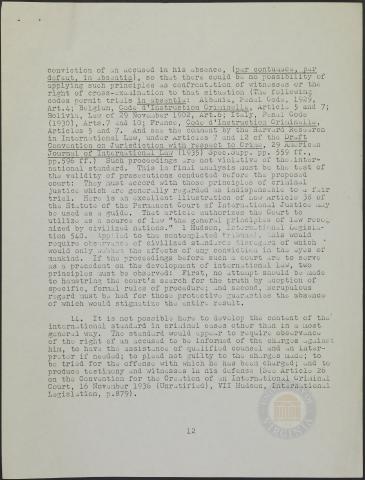
Page 12
| Parent | Perpetuation of testimony by Witnesses in U. S. for Presentation to the International Military Tribunal |
|---|---|
| Date | 18 June 1945 |
| Language | English |
| Collection | Tavenner Papers & IMTFE Official Records |
| Box | Box 3 |
| Folder | General Reports and Memoranda from June 1946 |
| Repository | University of Virginia Law Library |
conviction of an accused in his absence, (par contumace, par defaut, in absentia), so that there could be no possibility of applying such principles as confrontation of witnesses or the right of cross-examination to that situation (The following codes permit trials in absentia: Albania, Penal Code, 1929, Art. 4; Belgium, Code d’Instruction Criminelle, Article 5 and 7; Bolivia, Law of 29 November 1902, Art. 6; Italy, Penal Code (1930), Arts. 7 and 10; France, Code d’Instruction Criminelle, Articles 5 and 7. And see the comment by the Harvard Research in International Law, under Articles 7 and 12 of the Draft Convention on Jurisdiction with respect to Crime, 29 American Journal of Internal Law (1935) Spec. Supp. pp. 559 ff., pp. 596ff.) Such proceedings are not violative of the international standard. This in final analysis must be the test of the validity of prosecutions conducted before the proposed court: They must accord with those principles of criminal justice which are generally regarded as indispensable to a fair trial. Here is an excellent illustration of how Article 38 of the Statue of the Permanent Court of International Justice may be used as a guide. That article authorizes the Court to utilize as a source of law “the general principles of law recognized by civilized nations.” 1 Hudson, International Legislation 540. Applied to the contemplated tribunal, this would require observance of civilized standards disregard of which would only weaken the effects of any conviction in the eyes of mankind. If the proceedings before such a court are to serve as a precedent on the development of international law, two principles must be observed: First, no attempt should be made to hamstring the court’s search for the truth by adopting of specific, formal rules of procedure; and second, scrupulous regard must be held for those protective guaranties the absence of which would stigmatize the entire result.
14. It is not possible here to develop the content of the international standard in criminal cases other than in the most general way. The standard would appear to require observance of the right of an accused to be informed of the charges against him, to have the assistance of qualified counsel and an interpreter if needed; to plead not guilty to the charges made; to be tried for the offense with which he has been charged; and to produce testimony and witnesses in his defense (See Article 26 on the Convention for the Creation of an International Criminal Court, 16 November 1936 (Unratified), VII Hudson, International Legislation, p. 879).
12
